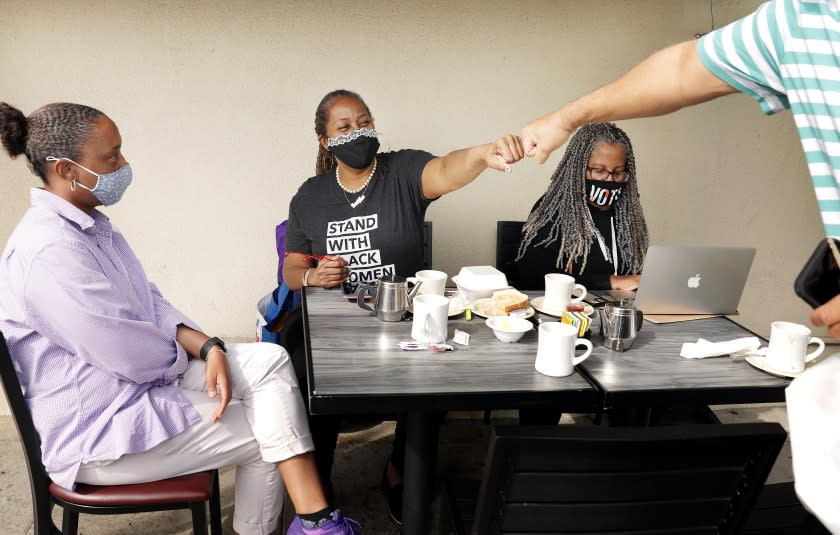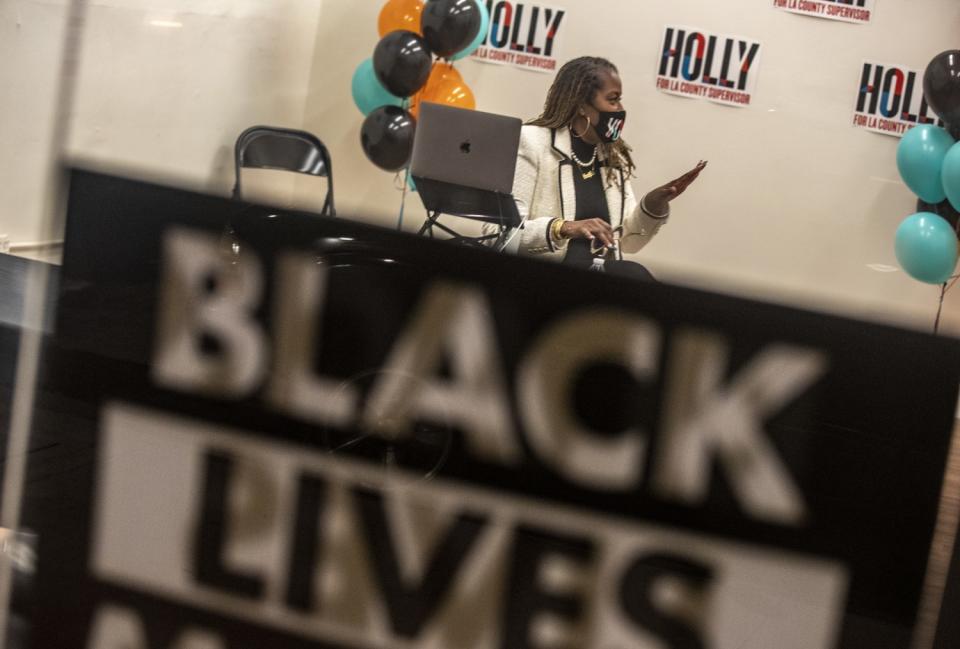Column: All hail the new 'queenmaker' of Black politics in California

With Kamala Harris only weeks away from being sworn in as the next vice president of the United States, Holly Mitchell is well aware that some Black Angelenos have put her at the top of their wish lists as a possible successor.
Fortunately for voters in Los Angeles County, who overwhelmingly elected Mitchell to the Board of Supervisors last week, she is “100% focused and committed to the job she got hired to do” and is “looking and thinking of nothing else.” But it's understandable why her name is being bandied about.
An appointment by Gov. Gavin Newsom would take Mitchell, 56, from being the only Black woman serving in the California state Senate to being the only Black woman serving in this U.S. Senate — and only the third to do so in the nation’s history, following Harris and Carol Moseley Braun of Illinois.
It's a reminder that, for all of the praise that has been heaped on Black women lately for being the backbone of the Democratic Party, there are still only a precious few at the highest levels of government.
Now imagine if that were different.
When we spoke a few days ago, Mitchell called it an "incredible responsibility" to be a Black elected official at this tumultuous moment in history. Voters, she said, have given her an "amazing opportunity" to reverse decades of systemic racism, including some of the many anti-Black policies that have come to a head this year.
"There is more and more value and understanding in terms of the role we play strategically in electoral politics, and in the leadership we play in policymaking across the board," she said. "And I'm unapologetic about that. I think that my life experience is a true reflection of the constituents I serve and I think there's power in that."
On election day, Mitchell rolled up to CJ’s Cafe on Pico Boulevard wearing a “Stand With Black Women” T-shirt. The next evening, the single mother who grew up in Leimert Park found out that voters had done just that.
With more than 60% of the vote, she beat longtime Los Angeles City Councilman Herb Wesson for the 2nd District seat on the soon-to-be all female Board of Supervisors.
While it's not a seat in the U.S. Senate, Mitchell, from her perch as one of the "five queens," will govern roughly 2 million people — about three times the number of people who live in some congressional districts. She also will be one of the state's most powerful Black politicians in terms of what she can do for Black people specifically, given that her district has long been seen as the heart of Black power in Southern California.
"She will be the queenmaker," said political consultant Dermot Givens.
People tend to forget — as I did before I was reminded by Manuel Pastor, a professor and director of the Equity Research Institute at USC — that L.A. County has more Black residents than Detroit.
Although they were once concentrated in South L.A., housing costs, gentrification and other factors have changed that, forcing a displacement that is escalating. Today, South L.A. is roughly two-thirds Latino — and almost all of South L.A. is in the 2nd Supervisorial District, which runs from Culver City to Compton.
"So if you're a Black political figure," Pastor said, "you have to run a very different kind of campaign and alliance building to be able to move forward."
Mitchell did that. And so, when she talks about implementing her agenda as supervisor, she does so through the lens of Black and brown unity.
"The reality is, Black people and brown people [are] living next door to each other who are experiencing the same challenges around housing affordability, around food insecurity, around trying to find access to appropriate health and mental health services, and jobs," she said. "And so it's a geographic area where people really suffer from many of the same kinds of societal challenges that they look to government to help them navigate."
The pressure will be on.
Mitchell, who came to politics after running the family advocacy agency Crystal Stairs, got more support from the progressive left than Wesson did. It's not all that surprising, given her history of backing criminal justice reform while she was a chair of the powerful state Senate budget committee. She's also known for the CROWN Act, which prohibits discrimination against Black and brown people in workplaces and schools for wearing natural hairstyles. Several states have passed their own versions of it.
Mitchell said she expects to be held accountable to an equally progressive agenda for Black and brown people once she officially takes office in L.A. County.
That includes dealing with the effects of COVID-19, which has hit residents of South L.A. the hardest. It also includes being ready for what could be a wave of tenant evictions early next year, when some protections implemented during the earlier days of the pandemic are set to expire.
Mitchell said she also plans to have some difficult conversations about how to reverse the rise in homelessness and shortage of affordable housing, given the legacy of redlining and threat of gentrification. During the last legislative session, Mitchell got tangled up in the Los Angeles versus San Francisco debate over Senate Bill 50, which would've made it easier to build apartment complexes near transit stops and in neighborhoods of single-family homes. South L.A. hated the idea.
"We have to keep pushing to figure out how we build a kind of L.A. that we're all comfortable in," Mitchell pushed back. "People can't just approach me to say, you know, what are you going to do about homelessness, when we're not willing to have an honest conversation about what we build, where and for whom."

Criminal justice reform is also on her to-do list. This summer has been filled with protests by Black Lives Matter, particularly in Compton after a string of controversial shootings by L.A. County Sheriff's Department deputies.
On Tuesday, the Board of Supervisors upped the ante. Citing Sheriff Alex Villanueva's refusal to abide by calls for transparency and accountability, it ordered county staff to examine ways to impeach or strip him of duties, including a possible bid to amend the California Constitution to make sheriffs appointed, rather than elected, positions.
"Part of my attraction to this job was recognizing the role L.A. County plays — good, bad or indifferent — in the criminal justice system," Mitchell said. "If we can look at reforms and get it right in L.A., it recognizes not only the impact it has on my home state, [but] the model for the country. So I absolutely intend to continue to do this work."
If this election has brought anything into the collective public consciousness, it’s that Black women should be recognized for more than rescuing the country from a would-be strongman with nuclear codes.
This story originally appeared in Los Angeles Times.

